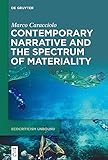Contemporary Narrative and the Spectrum of Materiality / Marco Caracciolo.
Material type: TextSeries: Ecocriticism Unbound ; 1Publisher: Berlin ; Boston : De Gruyter, [2023]Copyright date: ©2023Description: 1 online resource (IX, 210 p.)Content type:
TextSeries: Ecocriticism Unbound ; 1Publisher: Berlin ; Boston : De Gruyter, [2023]Copyright date: ©2023Description: 1 online resource (IX, 210 p.)Content type: - 9783111141497
- 9783111142739
- 9783111142562
- 808.036 23/eng/20231120
- online - DeGruyter
- Issued also in print.
| Item type | Current library | Call number | URL | Status | Notes | Barcode | |
|---|---|---|---|---|---|---|---|
 eBook
eBook
|
Biblioteca "Angelicum" Pont. Univ. S.Tommaso d'Aquino Nuvola online | online - DeGruyter (Browse shelf(Opens below)) | Online access | Not for loan (Accesso limitato) | Accesso per gli utenti autorizzati / Access for authorized users | (dgr)9783111142562 |
Frontmatter -- Acknowledgments -- Contents -- Table of Figures -- 1 Introduction -- 2 Object-Oriented Plotting -- 3 The Ethics of Materiality in the Multimodal Novel -- 4 Curating the Anthropocene Museum -- 5 The Fetish, the Grotesque, and the Castaway -- 6 Materializing Survival Games -- 7 The Office Weird -- 8 Mind among Material Ruins -- 9 Infrastructure and Collectivity in Video Games -- 10 Epilogue: Embracing the Spectrum -- Works Cited -- Index
restricted access online access with authorization star
http://purl.org/coar/access_right/c_16ec
How do physical things differ from non-things—human subjects, animals, abstract ideas, or processes? Those questions, which are as old as philosophy itself, have inspired contemporary debates in ecocriticism, thing theory, and in the interdisciplinary field of new materialism. This book argues that contemporary narrative is well placed to map out and work through the spectrum of the material and the philosophical questions that underlie it. This is because narrative does not resolve the tensions at the heart of conceptions of materiality but rather reframes them, envisioning their implications and exploring their relevance to concrete contexts of human interaction. This monograph is structured around a number of novels, experimental fiction, films, and video games that imagine the inherent agency of things but also interrogate the affective and ethical significance of materiality in human terms. Its aim is to demonstrate the power of formal narrative analysis to foster conceptually and ethically sophisticated ways of thinking about thingness in times of ecological crisis—that is, times in which "stuff" can no longer be taken for granted.
Issued also in print.
Mode of access: Internet via World Wide Web.
In English.
Description based on online resource; title from PDF title page (publisher's Web site, viewed 06. Mrz 2024)


